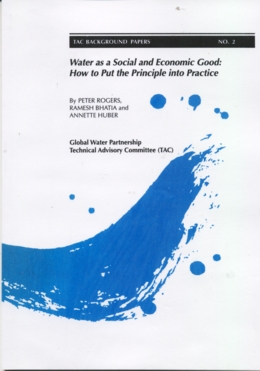 Agenda 21 and the Dublin Principles put the concept of water as an economic good on the global agenda, and they have received wide acceptance by the world’s water professionals. However, there is substansial confusion about the exact meaning of some of the articulated principles. In particular, it is not clear to many non-economists what is implied by the statement that water is an ”economic good“ or an ”economic and social good“. This paper addresses this lack of understanding by formulating the concept of water as an economic good and explaining, in practical terms, the economic tools that can be used to effect the environmentally, socially, and economically efficient use of water.
The potential role of economic tools in providing socially acceptable public decisions is not widely appreciated, particularly in many highly regulated situations. Furthermore, this paper suggests, contrary to the public perception, that with the improvement of the use of economic tools, the role for government regulation in managing water as an economic good is increased, not decreased.
The paper is divided into three sections following this introduction: Section I presents the general principles and methodologies for estimating costs and values in the water sector. In section II, some illustrative estimates of costs and values in urban, industrial, and agricultural sectors are presented based on available adta. Section III provides summary of results and conclusions.
Post Date : 22 Oktober 2008
|
